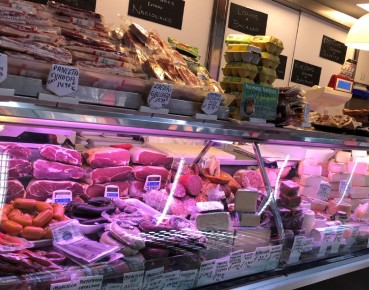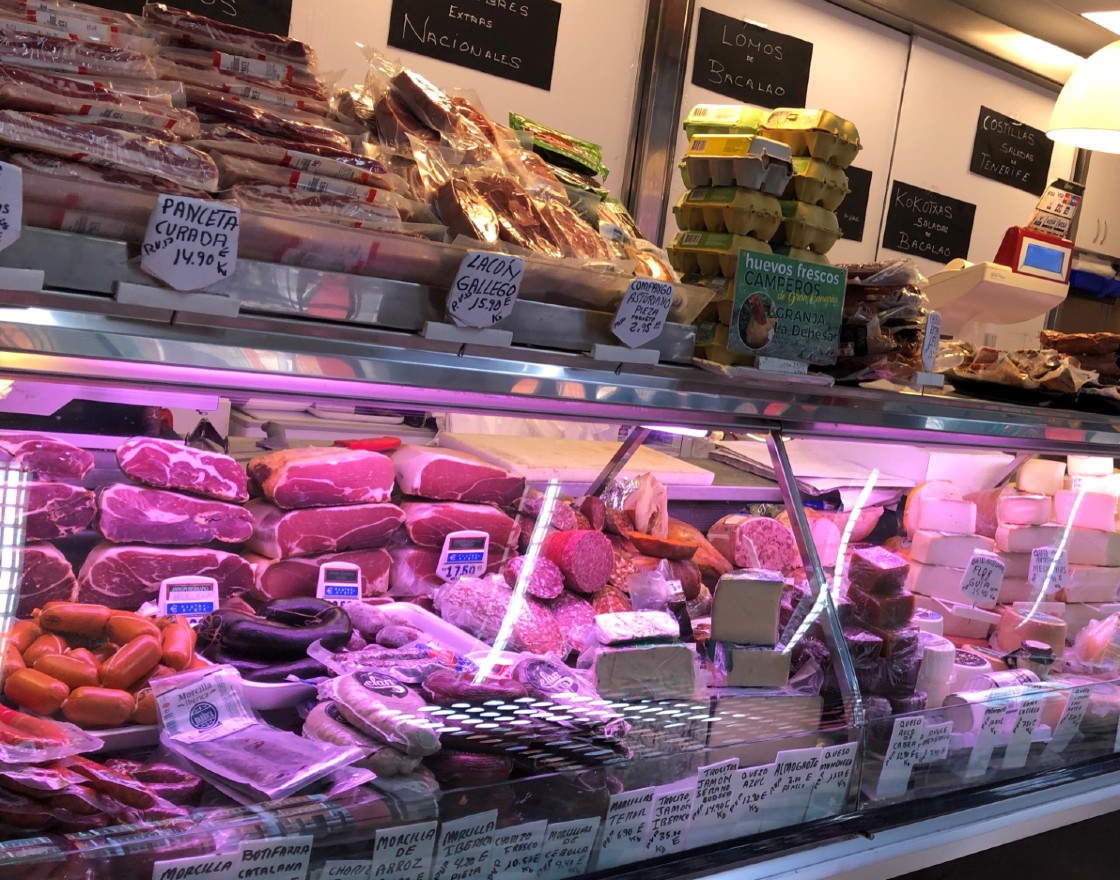
Las Palmas, Gran Canaria, Spain (Maria Bninska, Public domain)
According to Euractiv news site, FAIRR, a global network of investors dealing with environment, social policy and management in the protein supply chain, has designed and published a model aimed at helping investors to better understand the financial implications of climate change on this sector.
The model includes five of the world’s leading meat companies, such as McDonald’s and Burger King, and identified seven key consequences that will affect the sector’s profitability by 2050. They included increased electricity costs due to greenhouse gas generation, higher feed costs due to lower yields, and increased livestock mortality due to heat stress. „The costs of feeding poultry, pigs and cattle and veterinary care will increase as global temperatures rise. All companies have the potential to change that by choosing a so-called progressive climate path, which is investing in alternative proteins and selecting cereals to feed livestock faster and faster. better adapt to these changes, „said Jeremy Coller, founder of FAIRR and chief investment officer at Coller Capital. Also, it is projected that by 2050 alternative proteins will account for at least 16 per cent of the current meat market.
Europeans are the ones who consume far more meat and dairy products than the rest of the world population. Currently, around EUR32bn is earmarked annually for subsidies for livestock and meat production, which represents more than half of the budget for European agriculture (EUR58.4bn). The leading medical journal in the world, The Lancet recommends that by 2050 people should consume a maximum of 300 grams of meat per week for health and climate reasons. „Eating plants and seeds with low meat consumption has the effect of reducing greenhouse gases and improving climate change,” the magazine wrote, arguing that a vegetarian diet can feed the population. A non-governmental organization, Greenpeace goes even further and believes that by 2030, the entire population of the Earth should reduce its meat consumption by 70 per cent and as much as 80 per cent by 2050.
Europe’s goal is to reduce its share of greenhouse gases by 30 per cent by 2030, according to a statement from the European Agricultural Sector. But as Europe is only halfway to the goal, member states will have to redouble their efforts to achieve their climate ambitions. The agricultural, construction and transport industries, as well as SMEs, reduced their emissions by only 11 per cent between 2005 and 2018. This is only about one-third of what is expected by 2030. The agricultural industry managed to reduce emissions by only 1 per cent, while in the transport sector it was reduced by 8 per cent. According to a new report, several measures need to be taken to accelerate decarbonisation in agriculture, including supporting farms in their efforts to reduce emissions as quickly as possible, as well as encouraging organic farming and reducing the use of fertilizers and pesticides.
A coalition of animal health, environment and animal welfare organizations (TAPP) has called on the European Parliament in February 2020 to increase meat prices to amortize the high greenhouse gas emissions generated by the industry. The plan is to increase the price of meat in the European Union to reduce the adverse environmental impact of farmed animal production, including CO2 emissions and biodiversity loss. Parliament says that any revenue from the price hike will be reinvested in environmental conservation, and a vegetable and fruit tax could be reduced. The Greens have endorsed the proposed new meat pricing model and believe it should be included in the new EU food policy and the farm to fork strategy. Revenues, estimated at EUR32bn a year, would be invested in sustainable agriculture in 2030. A meat tax is likely to be included in the forthcoming EU Green Deal.
Specifically, the price of meat in the EU would increase by EUR0.47 per 100g of beef, EUR0.36 per 100g of pork and EUR0.17 per 100g of chicken. The introduction of taxes on animal and environmental issues is already under discussion in Germany and the Netherlands, and the general question of rising meat prices has been raised in other EU countries. „With its farm-to-fork strategy, the new commission is focusing on overall food production, and one of the key points in the environmental field is changing meat prices,” said Greens’ spokesman Bas Eickhout. He considers that retailers dominate the distribution of profits in the production system, while cattlemen and consumers pay a price for it. However, supporters of the price increase insist that it should not be called a tax but a fair pricing scheme. „When we deal with meat in terms of environmental concerns, costs are now borne by the society, not by the people who buy it,” said Robert Vergeer, a researcher at the institution that drafted the proposal.
The second objective of increasing the price is to reduce the consumption of meat and to increase the consumption of food of plant origin. If implemented, the tax would reduce consumption of chicken, pork and beef by 30-67 per cent by 2030. „We need to recreate the image of pastured animals that have good living conditions,” said Olga Kikou, head of Compassion in World Farming. This proposal has received criticism from farmers, and Daniel Azevedo of the COPA-COGECA Farmers Association said: „Such a plan will lead to the abandonment of rural areas, and in order to maintain and increase standards, a farmer needs to make money first so he can invest.”
Numerous critics argue that raising prices by a few cents could hardly have some major effect in reducing meat consumption, and on the other hand would cause great harm to livestock farmers. But there are still ways to address this, and one of the solutions was offered by Albert Stegemann, from the German CDU party: „Additional tax revenue should be used to support livestock farmers, which will help them restructure.” The German Farmers Association also spoke: „Animal welfare and climate protection do not serve if German farmers continue to invest themselves in higher standards of farming, and at the same time, lower-priced meat from other EU countries is on the market.” The Ministry of Agriculture estimates that Germans spend about EUR23.4bn annually on meat and are among the largest consumers of pork among EU countries. In the EU, VAT rates depend on each Member State. Currently, no EU country imposes a meat tax, although Sweden and Denmark have been debating the issue for years. For 2020, the German Ministry of Agriculture has announced a „Livestock Future Strategy”, the results of which are still not published.
Livestock, as well as the meat industry, are increasingly being targeted by environmental organizations, who believe that this sector is the most damaging to nature. A great deal of water is consumed in the meat industry, and as much as a third of the land cultivated is used to produce billions of tons of animal feed. Increasingly, the question arises as to whether such meat should be eaten, especially since there are numerous alternatives today. According to the food scientist and academic professor is known for her work on globally sustainable food production, Louise Fresco believes that leaving meat out of the production chain is no solution. „It is clear to everyone that animal husbandry is having an environmental and greenhouse gas impact, and that there is increasing thought about meat being dangerous for consumption. But we cannot solve the problem by eliminating one of the most important sources of protein for our body. Even if meat production and livestock production were discontinued, wild animals would be on target, and many cultures would start growing for food,” Ms. Fresco warned on the website Foodnavigator. She also cited examples of why we need animals for growing crops and human consumption. „Animal grazing gives the greatest hope of reducing greenhouse gases, and it is being implemented less and less in the world. Much of the world’s surface is either dry or too moist. The breeding ground is poorer, and it’s our fault, not the animals. It is this grazing of animals that can do what none of us humans can, and it is to turn inedible plants into very valuable crops and food,” explains Ms. Fresco. She also said animals can help solve the growing problem of food waste.
A recent study by Wageningen University reported that the problem of food consumption was much higher than one might think. They calculated that each person, on average, produces waste worth 500 calories, the equivalent of about three schnitzels, or a pound of apples, or a „slightly stronger” pork steak. „If we could use that waste to feed animals, that would be great,” Ms. Fresco said.
Vedran Obućina is an analyst and a journalist specializing in the Croatian and Middle East domestic and foreign affairs. He is the Secretary of the Society for Mediterranean Studies at the University of Rijeka and a Foreign Affairs Analyst at The Atlantic Post.


